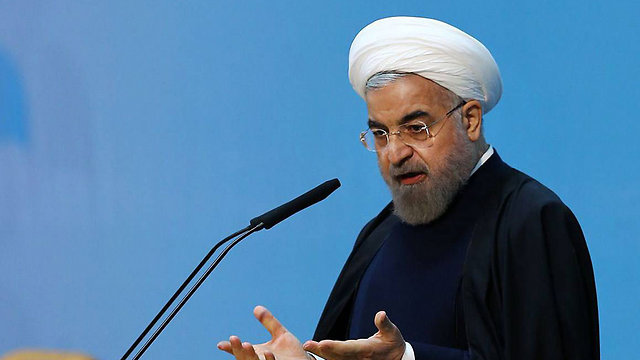Rouhani feels the pressure, too
Mehdi Khalaji/Washington Institute25/03/15
President Obama is not the only leader who feels he must deliver as the March 31 deadline nears to reach a framework for a nuclear agreement. Iran’s president, Hassan Rouhani, has staked his political present and future on his ability to conclude a deal. So far, the great majority of the Iranian people are staying with him, beckoned by the promise of lifted sanctions and better economic times—not to mention immunity from potential U.S. or Israeli military strikes.
Yet in Iran, daily living conditions have hardly been ameliorated by the partial relief in sanctions that accompanied the November 2013 interim agreement known as the Joint Plan of Action (JPOA). Businesses still have strictly limited access to the international banking system; unemployment, especially among university graduates, remains a national problem; the housing market is stagnant; and the government is struggling to pay its customary cash subsidies to citizens.
The patience demonstrated by Iranians with the nuclear talks has a different dimension: the relegating of human rights issues and democracy-related priorities to the backburner. According to Ahmad Shaheed, the UN Special Rapporteur on the Situation of Human Rights in the Islamic Republic of Iran, “The human rights situation in the country has deteriorated since Hassan Rouhani became president in 2013.” Number of executions has been significantly increased in last two years. Zahra Rahnavard, Mir Hossein Moussavi and Mehdi Karrobi, leaders of Green Movement are still under house arrest.
In acknowledging such unsettling trends, Rouhani and his fellow reformists have argued that if a nuclear deal comes first, other reforms will follow, paving the way for a more open and prosperous Iran. Those supportive of Rouhani think likewise that a nuclear deal, aided by lifted sanctions, could sideline the country’s hardliners and effectively safeguard Rouhani’s political survival for perhaps the next six years. The Rouhani camp’s eagerness to promise “full” sanctions relief, however, an impossible outcome, may ultimately haunt him.
Just as Obama is facing strong resistance from certain domestic blocs, Rouhani and his fellow negotiators are contending with powerful conservative opponents. On March 14, Hossein Shariatmadari, an appointee of Ayatollah Ali Khamenei who edits the hardline newspaper Kayhan, penned an op-ed titled “A Nuclear Agreement Is Impossible” in which he argues that expecting sanctions relief is unrealistic given that sanctions are the “most effective weapon in U.S. hands, which it would not put down.” He continues that the “realistic view shows that the nuclear challenge does not have an end, and reaching a deal in which Iran’s right is recognized is impossible.” In place of the current high-level talks, he calls for lower-level Iranian directors and experts to negotiate with the P5+1—as the five members of the UN Security Council and Germany are known—and for Iran to work harder internally to devise alternative solutions to ease the effect of sanctions.
Such statements from a Khamenei acolyte—indeed someone who often voices the Supreme Leader’s direct views to lend him personal immunity—beg some sort of explanation. Is the Supreme Leader, who has overtly if tepidly supported the talks, walking back his initial commitment? Or does the rhetoric indicate an early attempt to deflect blame should the talks falter?
Shariatmadari, it must be noted, does not call for the talks to end, implicitly recognizing that an unsuccessful result could damage hardliners as well as reformists. “Continuing negotiations is necessary,” he writes, “because first it would prove that the U.S. is not trustworthy and, second, Iranian nuclear negotiators have the upper hand in terms of legal and technical arguments which are the basis for the negotiations.” No Iranian involved in the talks wants to be blamed for their failure, which is why allowing them to continue indefinitely, if fruitlessly, is not always seen as the worst alternative.
Assuming the Supreme Leader and his allies aren’t prepared to actually block a nuclear deal, most Iranian people would be profoundly relieved by this outcome. But even for Rouhani, challenges would remain. Whatever the specific terms, hardliners would continue to pound the president over the deal’s unfavorable components. They would overstate the concessions required of the Islamic Republic and downplay the benefits. Rouhani’s political fate would, of course, be far grimmer in the event no deal is reached. Such an end would be seen as vindicating hardliner doubts over the point of the nuclear talks, and would give fodder for use against reformists entering the 2016 vote for parliament and the Assembly of Experts, a clerical body that reports to the Supreme Leader.
For the Iranian people, failed negotiations would be a great disappointment, and some would certainly look beyond Rouhani when casting blame. There would be the usual suspects, such as the Israelis and the Americans. The Supreme Leader has already assailed the West for its lack of seriousness and sincerity. But persistent sanctions would inevitably stir anger toward the clerical establishment, including Khamenei. A situation characterized by economic stricture and military insecurity would make Iran a chronically unpleasant place to live.
This is why Khamenei also wants a deal within the existing framework and timetable; albeit a deal with terms the P5+1 may be unable to offer. And while Rouhani may shoulder the more immediate political consequences of a failure, Khamenei and his cadres would eventually feel rising dissent in the longer term from an increasingly desperate polity.
For Obama, the imperative to achieve an agreement may be pressing, but the talks are safely ensconced in the U.S. foreign policy sleeve. For Rouhani as well as his adversaries, the talks aren’t only about foreign policy, but about their political survival, their relationship to their constituents, and the basic health of their country.
**Khalaji is a senior fellow at the Washington Institute for Near East Policy and scholar on Islam.






















